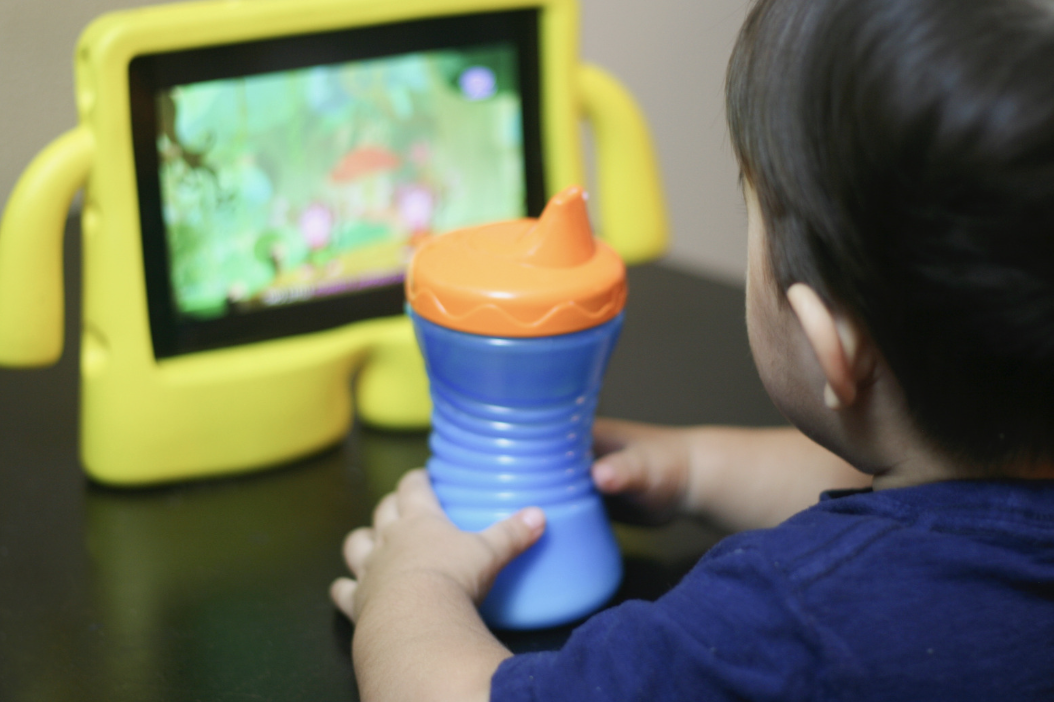Many of us grew up glued to the tv. Every. Day.
We watched before school, during dinner and before we went to bed.
For variety, we’d pour ourselves a bowl of sugary cereal (or three), put on some cartoons and call it a perfect Saturday morning.
Since then, screen use has only increased.
Smart phones, tablets, laptops, and video games are all commonly used by children and adults alike.
And while technological advancements have made these devices accessible (and sometimes necessary), screen time isn’t always helpful. This is especially true for children.
Today, we’ll explore the negative impact excessive screen use has on them, and the best ways to limit it.
Why is Screen Time Bad for Children?
Too much screen time can lead to:
Less Unstructured Play
Unstructured play is particularly important for children ages 2 and under.
In this type of play, they learn to move around, explore the world, problem solve, and connect to others. Unstructured play promotes healthy childhood development and provides physical activity.
When children are glued to devices, they don’t get enough of this essential playtime.
It’s recommended that children under the age of two have no screen time. Those between 2 and 5 should have a maximum of 1 hour/day of educational screen time.
Obesity
Excess screen time may put children at risk of obesity for a few reasons.
Firstly, advertising for unhealthy foods can have a long-lasting influence on children’s food preferences. Additionally, ads may actually increase mindless eating (even of foods not being advertised).
Also, children who eat most meals during screen time tend to consume more unhealthy, high-calorie foods. Screen use during meals may increase the period of time a child eats for, and distract from feelings of fullness.
Lastly, screens cause sleep disturbances, which can lead to obesity. Children may delay sleep to watch tv or play video games. Also, blue light can cause sleep problems. Less sleep can cause more eating and snacking outside of normal times. It may also disrupt hormones that control appetite, which causes increased hunger.
Poor Sleep
As mentioned, screen time negatively impacts sleep. Aside from increased risk of obesity, this can cause problems with:
- Behavior (hyperactivity, impulse control issues)
- Mood (emotional regulation issues, irritability)
- Concentration
- School performance
- Increased risk of accidents and injury
- Reaction time
Exposure to Inappropriate Content
Children who have unmonitored screen time might see content that’s not appropriate for their age. This can include:
- Aggression and violence. Children might become desensitized to violence, learn that it’s a useful way to solve problems, or repeat violent behaviors. This is more likely for children who already have aggressive tendencies.
- Scary content, which can cause distress and fear (especially for very young children). This includes both fictional and non-fictional materials, like horror movie ads, news coverage, etc.
- Sexually explicit content
Tips to Limit Screen Time
- Set a good example by limiting personal screen time
- Turn off all screens during mealtime
- Make screen time a family affair. Watch with children and explain things that come up.
- Set parental controls to manage what children have access to
- Review content before allowing children to consume it (like checking maturity ratings)
- Encourage physical activity while using screens (such as stretching during commercials or getting up frequently when playing video games)
- Set tech-free zones and curfews (like no screen time first thing in the morning)
- Turn off the tv when no one is watching
- Don’t allow tv’s in children’s bedrooms, and keep all other devices outside of the bedroom at night
- Be mindful of when/if we allow children to have their own devices
Additional Tips
We won’t always be able to monitor our children’s screen usage. That’s why it’s important to teach them digital literacy and encourage appropriate behaviors, like:
- Critical thinking skills to question whether things they view are accurate/real
- Understanding that ads are used to make money and aren’t necessarily helpful
- General internet safety (data safety, talking to strangers, spotting fake sites)
- Encouraging children to participate in activities that don’t require screens
Summary
Screens are here for the long haul, and they’re not all bad. They can provide access to educational content, connection to others, and entertainment.
But it’s important that we limit children’s screen time (and our own) to avoid negative consequences.
By helping them find a good balance, we can increase their chances of thriving physically, mentally, and emotionally.
Sources


